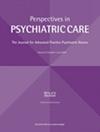The Influence of Satisfaction with E-Learning on the Psychological State of Nursing Students
IF 1.9
4区 医学
Q2 NURSING
引用次数: 0
Abstract
Aim. The education system has transitioned from traditional learning to e-learning. Earlier, researchers tested the feasibility of e-learning for nursing students. However, whether satisfaction with e-learning affects students’ mental health remains unknown. This study aimed to determine the influence of satisfaction with e-learning on mental health (stress, anxiety, and depression) among undergraduate nursing students. Methods. This study design was cross-sectional, correlational, and descriptive. Data were collected between April and December 2022 from local nursing colleges in 13 regions in Saudi Arabia. A convenience sampling method was employed to recruit undergraduate nursing students. One hundred forty-four students responded to the online questionnaire. Results. Nursing students demonstrated moderate levels of anxiety (M = 9.89 (SD = 4.28)), stress (M = 10.40 (SD = 4.05)), and depression (M = 9.64 (SD = 4.38)). The average satisfaction with e-learning score was 2.79 (SD = 0.85), indicating that students’ satisfaction was low. Strong and positive correlations existed between anxiety and stress (r = 0.787, p < 0.001 ) and depression (r = 0.867, p < 0.001 ). However, anxiety, stress, and depression were not correlated with satisfaction. Female participants demonstrated more significant anxiety (M = 11.0, SD = 3.55), stress (M = 11.3, SD = 3.5), and depressive symptoms (M = 10.9, SD = 3.6) than their male counterparts. Stress significantly and indirectly affected depression through anxiety (B = 0.580, p < 0.001 , 95% CI 0.449 to 0.719). The proportion of mediation ( P M = 0 . 697 ) indicated that 69.7% of the total stress effect on depression was because of the indirect impact of anxiety, acting as a partial mediation. Conclusions. This study emphasized providing mental health services for nursing students. Conducting qualitative research will help achieve knowledge of nursing students’ mental health status.网络学习满意度对护生心理状态的影响
目标教育系统已经从传统学习过渡到电子学习。早些时候,研究人员对护理专业学生进行了电子学习的可行性测试。然而,对电子学习的满意度是否会影响学生的心理健康仍然未知。本研究旨在确定护理本科生对电子学习的满意度对心理健康(压力、焦虑和抑郁)的影响。方法。本研究设计为横断面、相关性和描述性研究。数据是在2022年4月至12月期间从沙特阿拉伯13个地区的当地护理学院收集的。采用方便抽样的方法对护理本科生进行了招生。一百四十四名学生回答了在线问卷。后果护生表现出中度焦虑(M = 9.89(标准差 = 4.28)),应力(M = 10.40(标准差 = 4.05))和抑郁症(M = 9.64(标准差 = 4.38))。电子学习的平均满意度为2.79(SD = 0.85),表明学生满意度较低。焦虑与压力之间存在显著正相关(r = 0.787,p < 0.001)和抑郁症(r = 0.867,p < 0.001)。然而,焦虑、压力和抑郁与满意度无关。女性参与者表现出更显著的焦虑(M = 11.0,标准差 = 3.55),应力(M = 11.3,标准差 = 3.5)和抑郁症状(M = 10.9,标准差 = 3.6)。压力通过焦虑显著和间接影响抑郁(B = 0.580,p < 0.001,95%CI 0.449-0.719) . 697)表明,69.7%的压力对抑郁的影响是由于焦虑的间接影响,起到部分中介作用。结论。本研究强调为护生提供心理健康服务。进行质的研究有助于了解护生的心理健康状况。
本文章由计算机程序翻译,如有差异,请以英文原文为准。
求助全文
约1分钟内获得全文
求助全文
来源期刊
CiteScore
5.00
自引率
4.30%
发文量
139
审稿时长
>12 weeks
期刊介绍:
Perspectives in Psychiatric Care (PPC) is recognized and respected as THE journal for advanced practice psychiatric nurses. The journal provides advanced practice nurses with current research, clinical application, and knowledge about psychiatric nursing, prescriptive treatment, and education. It publishes peer-reviewed papers that reflect clinical practice issues, psychobiological information, and integrative perspectives that are evidence-based. Perspectives in Psychiatric Care includes regular columns on the biology of mental illness and pharmacology, the art of prescribing, integrative perspectives, and private practice issues.

 求助内容:
求助内容: 应助结果提醒方式:
应助结果提醒方式:


